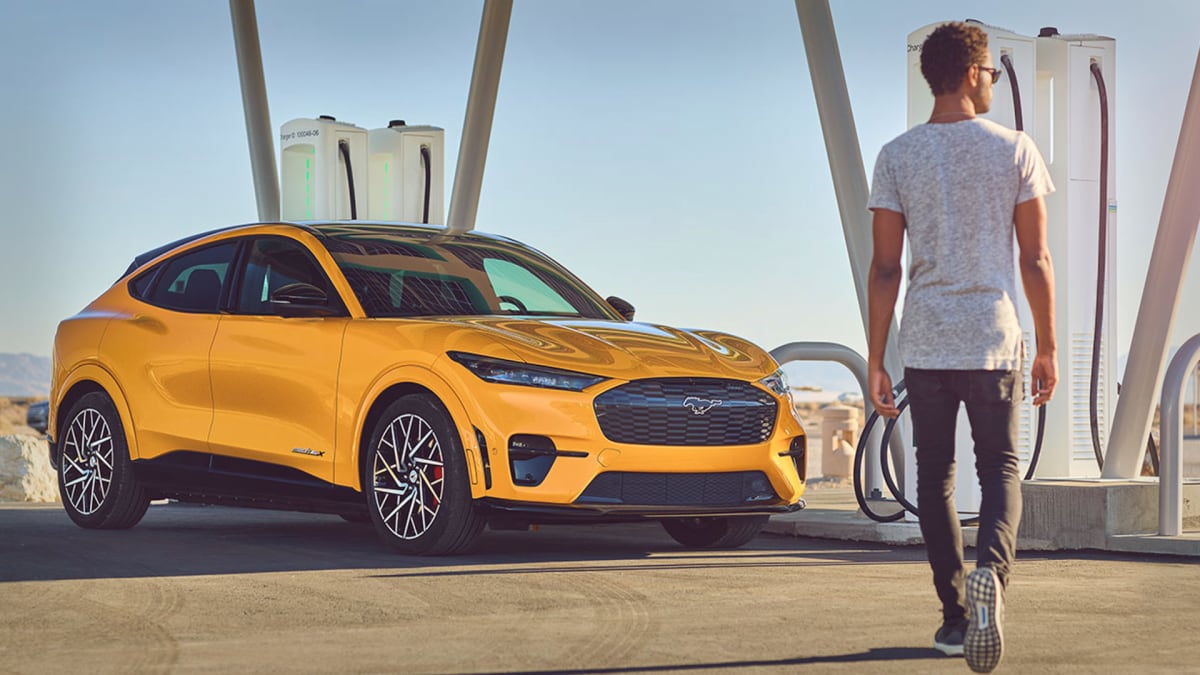
Ford (F) continues its transformation.
The automaker is determined to put on its side everything that can allow it to compete point by point with Tesla (TSLA), identified by CEO Jim Farley as the main rival of the legacy automaker.
It is therefore no surprise that the brand with the blue oval has reorganized its activities, in order to breathe a start-up spirit into its teams and get rid of the administrative burden and complexities of large companies which often slow down the decision-making process.
The manufacturing activities of gasoline cars, or internal combustion engine (ICE) vehicles, have been housed in an entity called Ford Blue, while the development of electric vehicles, or battery electric vehicles (Bev), is now independent under Ford Model e.
Farley also hired tech talent to give the Ford Model e a boost and adopted Tesla's over-the-air strategy of regularly updating software in vehicles with new features and functionality. When there is an update, vehicle owners are notified and given instructions on how to do it themselves. This allows the vehicle to be always updated with the latest innovations and ensures the car manufacturer a good source of income.
Multi-Billion Dollar Investment
Ford wants to waste no more time. It is for this logic that the group has just forced the breakup of Argo AI, its subsidiary for the development of autonomous technologies, of which Volkswagen (VLKAF) was also a major shareholder.
Ford and Volkswagen had invested billions of dollars in Argo AI in 2017 with the hope that it would allow them to bring driverless vehicles on the roads under specific conditions by 2021. But by withdrawing its support for Argo, which is now forced to close for lack of new shareholders, Ford seems to admit that autonomous technology is not ready for now.
The adventure was costly since the brand with the blue oval recorded an impairment charge linked to Argo AI of around $2.7 billion for the third quarter, thus causing a net quarterly loss of $827 million. Volkswagen has not yet published its results but it is more than likely that Argo Ai has also caused a financial hole for the German giant.
The group from Dearborn, Michigan, prefers to focus its efforts on the L2+ and L3 levels of autonomy, where the vehicles can drive alone and perform maneuvers on pre-mapped roads.
"It's estimated that more than a hundred billion has been invested in the promise of Level 4 autonomy," Farley told analysts during the third quarter earnings' call. "And yet no one has defined a profitable business model at scale."
"Commercialization of L4 autonomy, at scale, is going to take much longer than we previously expected," added Doug Field, chief advanced product development and technology officer. "L2+ and L3 driver assist technologies have a larger addressable customer base, which will allow it to scale more quickly, and profitability."
Basically, Ford will focus on driver assistance systems. The group currently has two: Ford BlueCruise and Co-Pilot360. The features allows a driver to operate hands-free on prequalified sections of divided highways. The driver’s eyes must remain on the road. Ford will continue to develop them to add new features
The Society of Automotive Engineering (SAE), which sets standards for the engineering industry, has defined six levels, ranging from Level 0 (no assistance) to Level 5 (full self-driving in all conditions). A vehicle's technology must reach all six before it is officially autonomous.
'Attractive Revenue Streams'
Most new cars feature Level 1 technology, such as lane-assist and adaptive cruise control.
Farley said Level 2 and Level 3 of autonomy will arrive with 2022-2025 model year EVs.
"Ford is completely refreshing it's EV lineup globally, introducing fully updatable electrical architectures and in-house software development for controlling the vehicle," the Chief Executive Officer said.
He added on Twitter that "Yes, there is potential for attractive revenue streams tied to L3. But at the end of the day, it’s about giving millions of people time back & lesson (sic) the monotony of highway miles & stop-and-go traffic."
Ford, however, continues to believe that driverless cars are possible, even though the technology is not yet fully developed.
"As for the future of true L4 autonomy: We still believe it will be incredibly impactful in the long term," Farley said. "The muscles we build w/ our new talent in deploying a transformative BlueCruise L3 system will be essential to the future of accessible, driverless vehicles in everyday life."
Is This the End of Driverless Cars?
Nevertheless, by shutting down Argo AI, Ford gives the kiss of death to its driverless vehicle goals. Rival Tesla has promised its vehicles will be self-driving by the end of the year but its highly advanced Full Self-Driving (FSD) driver assistance system is under investigation by regulators following its involvement in fatal accidents.
The FSD is even at the center of a criminal investigation by the Department of Justice (DoJ). The investigation focuses on whether the company misled customers about the capabilities and safety of the self-driving feature.
For a long time automakers have sold the idea that driverless vehicles would be on the roads before this year. Tesla was among the most ambitious. During Tesla Autonomy Day in 2019, CEO Elon Musk proclaimed that "a year from now" there would be "over a million cars with full self-driving, software, everything."
Musk has promised that by the end of 2022, Tesla vehicles will be able to drive themselves completely even as the automaker keeps repeating that its cars aren't self-driving.







